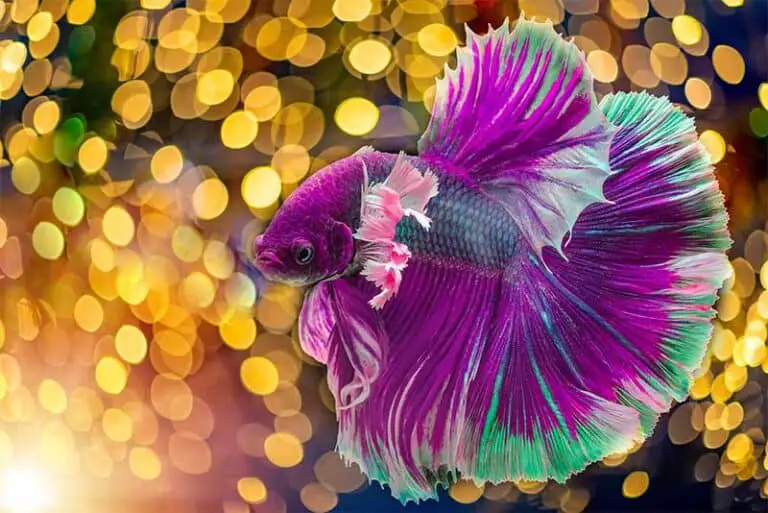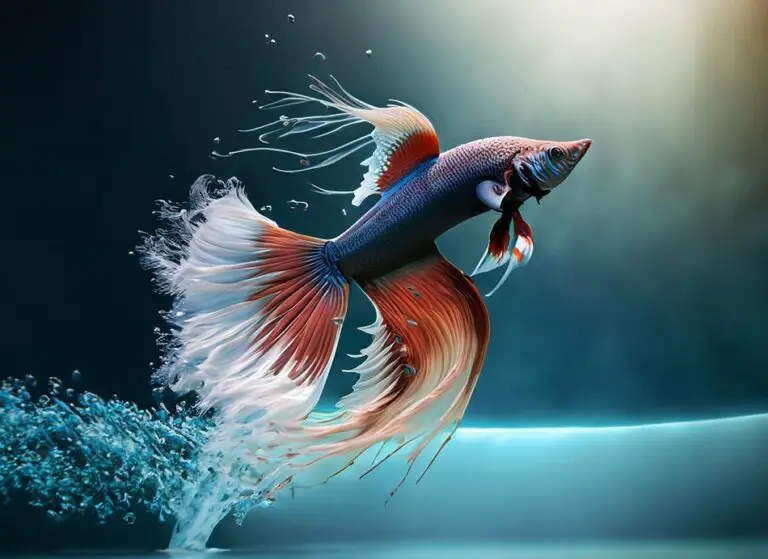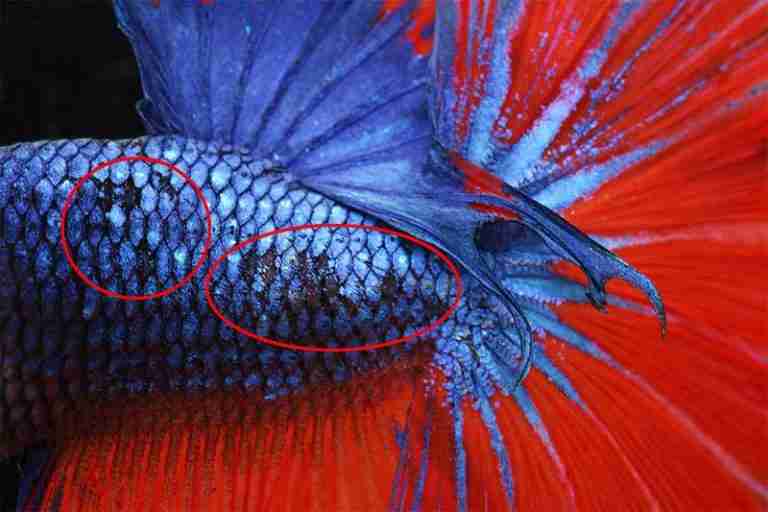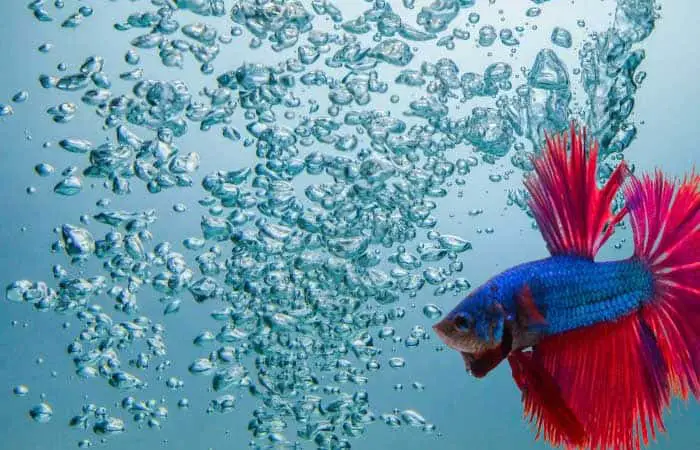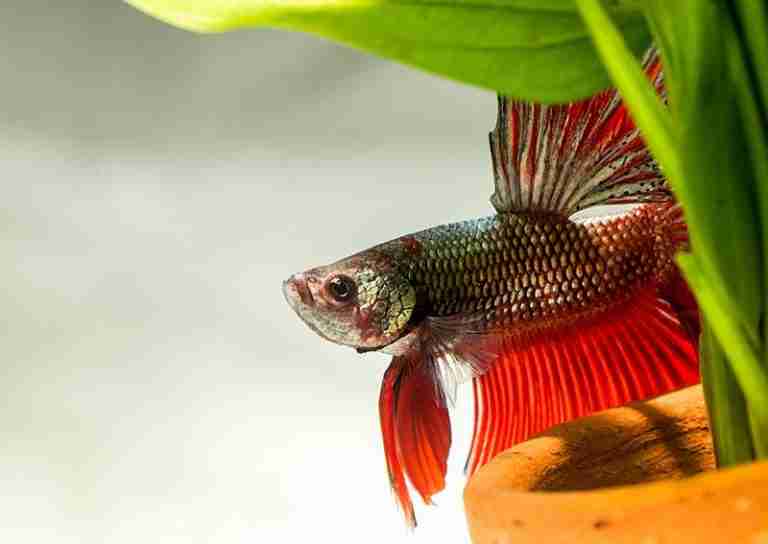What Do Betta Fish Eat (A Comprehensive Diet Guide)
When caring for a betta fish, there are lots you need to learn, and one of the most important is understanding their dietary requirements. So what do betta fish eat, and what foods should a betta fish avoid?
Betta fish are omnivores that require a varied diet consisting of protein-rich foods like worms, shrimps, and insects, while also benefiting from the addition of plants, vegetables, and fruits. A well-balanced diet will aid the digestive system and benefit your betta’s overall health.
In this article, I’ll be sharing my knowledge as an experienced fish keeper and betta fish owner. You’ll learn what types of food bettas need, how much they should eat daily, and other important tips on providing them with the nutrition they require.
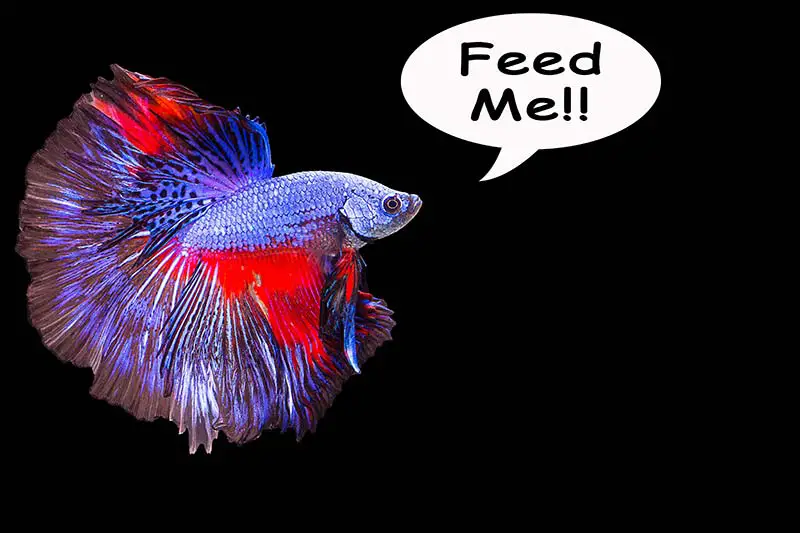
If you’re ready to become a better aquarist by learning more about proper betta care, then keep reading!
What Should I Feed My Betta Fish?
Feeding your betta fish is one of the most important things you can do to ensure its health and happiness. It’s essential that you know what kind of food a betta needs in order to stay healthy, as well as which types are available to offer it.
A balanced diet rich in proteins should be the foundation of any betta fish meal. To achieve this, there are several kinds of foods on the market today, such as frozen or freeze-dried food, flakes, and pellets.
It’s also imperative to keep an eye on water quality when providing food for your betta. Poor water conditions could lead to illnesses like bacterial infections or fin rot, so it’s very important to regularly test pH levels and other parameters.
With the right diet tailored specifically towards their nutritional needs paired with proper maintenance of the tank environment, you can’t go too far wrong.
Now let’s take a closer look at some of the different types of food betta fish eat.
Types Of Food Bettas Eat
As omnivores, betta fish eat a variety of foods. The staple food for a pet betta fish is usually high-quality betta pellets. These should be fed in moderation, as overfeeding can lead to health problems. Other commercial fish foods such as Hikari Betta Bio-Gold or frozen shrimp can also be given occasionally as treats.
In addition to using good quality staple food, some owners like to feed their bettas live insect larvae or mosquito larvae. Plant roots from fresh vegetables or certain fruits and vegetables can also make excellent snacks for your little fish friends. All of these items should only be used sparingly and must never exceed more than 20% of the total diet.
Overall, it’s best to stick with good quality pellet food for the majority of your betta’s meals. This ensures that all his nutritional needs are met without risking an unbalanced diet due to too many treats.
With this in mind, let’s explore what betta fish would eat if living in the wild.
What Do Betta Fish Eat In The Wild?
Wild betta fish are excellent hunters that eat whatever they can catch, including insects, crustaceans, plant material, and other small creatures.
In the wild, bettas feed on different types of prey depending on the species. Some may hunt for live food, such as bloodworms or brine shrimp, while others may consume larger prey like daphnia or mosquito larvae. They also snack on various types of plant matter like algae and zooplankton found near the surface of the water.
In their natural habitat, betta splendens will often feast upon insect larvae and tiny bits of fish meal they find along the bottom of streams and rivers.
What Do Betta Fish Eat In Captivity?
In captivity, betta fish will eat a variety of foods. Experienced betta keepers will tell you the best diet for your pet is one that includes:
- Betta Fish Pellets.
- Tropical Fish Flakes.
- Live Foods (Can also be frozen or freeze-dried).
- Vegetables and Fruits.
High-quality betta fish pellets are designed to provide all the nutrients your fish needs on a daily basis, as they contain protein from animal sources as well as carbohydrates and vitamins that help with growth and development.
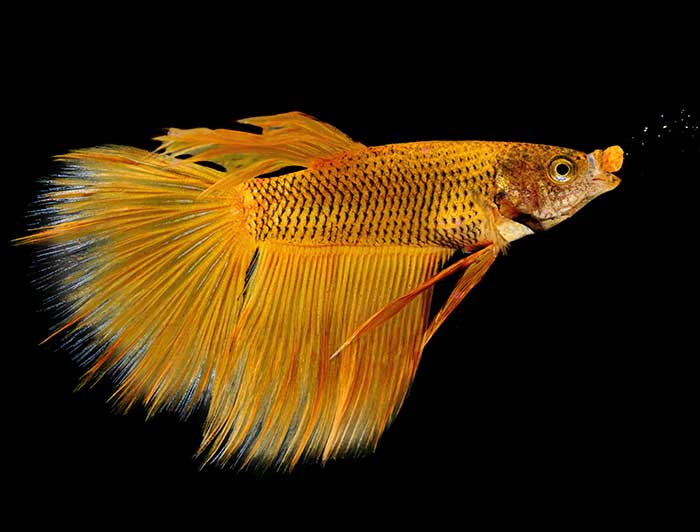
Tropical fish flakes are not always as nutritionally complete and can cause digestive issues if given in large amounts. Live foods should be offered as occasional treats alongside pellets and flakes!
Finally, include some vegetables, grated finely or blanched and added to the betta’s diet to aid in good, overall digestion. This will ensure that your pet gets adequate nutrition without having to resort to processed foods alone.
You can also supplement their diet with frozen or freeze-dried foods designed specifically for tropical fish, like freeze-dried krill, plankton cubes, and spirulina pellets.
While not required, having some type of tank cleaning crew is encouraged to help keep your betta’s home clean, so they have a healthy source of food available at all times.
As long as you provide your betta with a varied diet full of high-quality ingredients that mimic what they would eat in nature, your finned friend should stay happy and healthy!
The key to success when it comes to feeding your betta is moderation – offering small amounts of food several times per day is much better than overfeeding them once every few days!
With careful consideration, any fish keeper can create an appropriate betta fish diet tailored specifically for their own unique pet!
Betta Fish Pellets
Betta fish require a healthy diet to stay vibrant and active, so finding the right food is essential. Betta pellets are one of the most common sources of nutrition and offer an easy-to-use solution that meets their dietary needs.
What I Use
There are several brands of high-quality pellet foods available to choose from, such as:
- Aqueon Pro Formula Betta Pellets – (Find the best price)
- Northfin Food Betta Bits – (Find the best price)
- TetraBetta Plus Floating Pellets – (Find the best price)
- Hikari Betta Bio-Gold Baby Pellets – (Find the best price)
Each brand offers its own unique recipe packed with vitamins and minerals that help promote health in your fish. Some even contain probiotics or added color enhancers which can make them appear more vivid when dining on these tasty treats.
Many pet stores will carry specialized betta pellets designed to meet specific nutritional requirements depending on the species being kept. It’s important to always follow label instructions when feeding any type of food to ensure they receive optimal nutrition while remaining healthy and happy in captivity.
Most bettas should be fed two small meals each day consisting mainly of pellets supplemented with some live or frozen food items like bloodworms, brine shrimp, or other aquatic crustaceans a few times per week. Overfeeding is a common problem among hobbyists, so it’s best not to overdo it – just enough to keep them satiated without making them bloated or lethargic!
Betta Fish Flakes
Like pellets, betta fish flakes are like the bread and butter of a betta’s diet. If you find a good flake food specifically for betta fish, they provide all the essential nutrients, proteins, amino acids, minerals, and vitamins needed to keep your betta healthy and happy.
Betta fish flakes come in many different varieties, so you can choose what best suits your finned friend. Some common brands are:
What I Use
Betta fish flakes come in many different varieties, so you can choose what best suits your finned friend. Some common brands are:
- Omega One Betta Buffet Flakes – (Find the best price)
- Ocean Nutrition Brine Shrimp Flakes – (Find the best price)
- Glofish Betta Flakes – (Find the best price)
Similar to pellets, you can use flakes as the main part of your betta’s diet while supplementing with a variety of live, frozen, or freeze-dried foods several times per week.
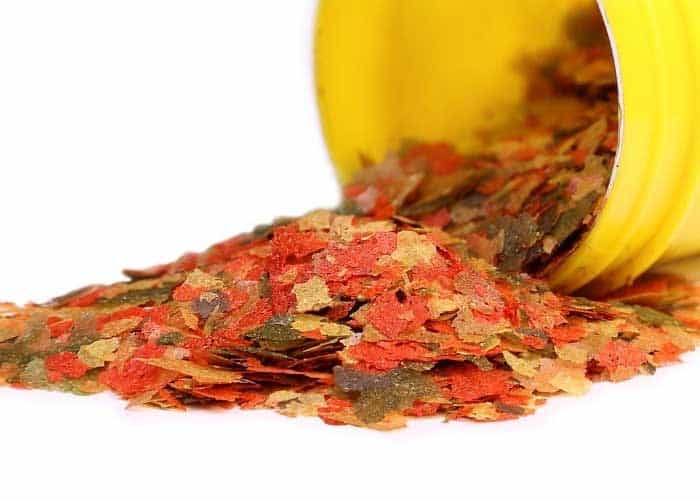
When choosing what type of food to give your betta, make sure that it is nutritionally balanced with enough carbohydrates and protein for them to stay active and healthy. Betta fish flakes provide this balance, along with vital minerals and vitamins, which help promote good health in your beloved pet.
In addition, flakes are easy to store and feed, making them a convenient choice when caring for your betta. With such an array of options available, you’ll be able to find the perfect mix to fit into your budget while keeping your little buddy well-nourished!
Now let’s take a closer look at freeze-dried betta food options.
Freeze-Dried Betta Food
In addition to betta flakes, freeze-dried betta food is an excellent choice for your betta’s diet. Freeze-dried foods are nutritious and can add some variety to their regular meals.
Common freeze-dried foods include:
- Mysis shrimp
- Bloodworms
- Brine shrimp
- Tubifex worms
- Krill.
If you want to be extra careful, you should note that some freeze-dried food may contain heavy metals, which can be damaging over time, so make sure you check the label before purchasing.
You can also use freeze-dried foods as special treats or extra food when needed. Just remember not to feed them too much since they don’t have the same nutritional value as live & frozen foods.
The freeze-drying process has some benefits, such as killing harmful bacteria and parasites, which makes the food safer for consumption, but the process also reduces much of the nutritional goodness.
All of my fish love freeze-dried bloodworms, but I prefer to use the frozen alternative where possible.
Overall, while freeze-dried foods may be convenient and provide some variety in a betta’s daily feeding regimen, nothing beats fresh live & frozen food for providing the essential nutrients required for optimal health.
Live & Frozen Betta Food
Live foods make up a large part of a bettas diet in the wild. Live foods are nutrient-rich and perfect for a high-protein diet.
Live foods help betta fish maintain their hunting instinct, but frozen betta food is a great alternative as it can be stored for many months while retaining most of its valuable nutrient content.
The table below shows the most common live and frozen foods that bettas eat, along with their basic nutritional benefits. Frozen foods have a slightly lower nutritional value.
| Food | Benefits |
|---|---|
| Brine Shrimp | Essential nutrients, fatty acids, Fibre, Energy, and Omega 3’s |
| Baby Brine Shrimp | Essential nutrients & fatty acids, Fibre(Suitable for baby betta fish) |
| Mysis Shrimp | Essential nutrients & fatty acids |
| Mosquito Larvae (Or Other Insect Larvae) | High In protein & fatty acids |
| Bloodworms | Nutrient-rich and high in protein |
| Daphnia | High in protein & Fibre – Excellent for good digestion. |
| Wingless Fruit Flies | High in protein & Minerals |
| Tubifex Worms | High in protein & Fatty acids |
Feeding your bettas with live foods can also help improve their overall digestive system health over time.
Shrimps are a favorite food for betta fish which is why some owners breed them in a separate tank, creating an abundant supply.
Live or frozen shrimp provide vital nutrients that cannot be found in processed fish food diets, but It’s important to feed them the right type of frozen shrimp as well.
While some shrimp make great food, many species are kept as aquarium pets, such as bumblebee shrimp, cherry shrimp, and ghost shrimp. I wouldn’t advise keeping any shrimp as a pet unless you’re happy to risk losing them to your hungry betta.
Although live foods are a great accompaniment alongside pellets and flakes, fruits and vegetables should also be considered in order to ensure optimal dietary health.
Can Betta Fish Eat Fruits Or Vegetables?
You would assume that bettas are carnivorous fish due to their high protein requirements. The truth is betta fish are omnivorous creatures that can benefit from a diet that includes plant-based foods.
Betta fish often suffer from bloating and constipation, which can be easily remedied by providing a natural diet and regular access to vegetables. Ensure vegetables are blanched before feeding to soften them up and make them more suitable for the betta’s digestive system.
Some vegetables and fruits you can try are:
- Zucchini
- Boiled peas
- Sweetcorn
- Lettuce
- Spinach
- Cabbage
- Roots of plants
- Melon
- Strawberry
- Pear
- Apple
- Berries
It is important to provide actual betta pellets in addition to these natural food sources, as their ingredients ensure that you’re providing a balanced diet needed for healthy betta growth.
A combination of different types of live food items, along with some vegetables or fruits blended together, would create a nutritious meal plan for any betta fish.
Remember that not all fruits and vegetables are safe, as some may contain toxins that could harm the fish’s health. As always, variety is vital – no one type of food should make up the entirety of their diet – but care must be taken to ensure only safe ingredients are included in meals prepared at home.
What Is The Best Food For Betta Fish?
Betta fish have complex dietary requirements which must be met in order to ensure your little buddy stays healthy. So, what is the best food for your betta fish?
The best food for betta fish is live foods that they find in the wild such as bloodworms and shrimp. Mixed with some plant matter or fruit, you will have provided everything they live on in their natural environment.
In captivity, some swear by pellet foods, while others prefer freeze-dried or fresh food options. No matter what type of diet you choose, it’s important not to overfeed your betta, as excess food can quickly cause health problems such as bloating, constipation, and swim bladder disease.
In addition, it’s essential to look for high-quality betta fish food with no artificial additives or fillers. Look for one that contains mostly crude protein (at least 40%) from animal sources like insects, shrimp, and whitefish meal. This will ensure your finned friend receives the proper nutrients.
In summary, when hunting down the perfect diet for your beloved companion, make sure to scrutinize labels closely and opt for high-quality ingredients designed for betta nutrition. Also, consider introducing different types of food into his daily meals so he gets all the nutrients he needs without making dinner boring!
Below is an informative video I found that discusses the best food for betta fish.
How Often Do Betta Fish Need Feeding?
It’s vital that you know how often to feed a betta fish as too often or too little can lead to poor health, although it’s always better to slightly underfeed them to avoid digestion issues or waste buildup in the tank.
When it comes to betta food diets, most experts agree that feeding a betta fish twice a day provides plenty of nourishment without over-feeding. While some recommend feeding once daily, this can limit the fish’s nutrition and cause sluggishness or boredom. Betta fish shouldn’t need feeding more than three times per day.
Fasting is a good practice to follow for any fish species and requires you to not feed them for 1 or 2 days a week. While it may seem cruel, fasting allows your betta’s intestines to clear, which is very good for healthy digestion, and they will hunt for excess food waste if they become hungry.
Whether you fast your betta for two consecutive days or spread it out is up to you. My routine is to withhold food on the weekend (Saturday/Sunday) as it’s an easy routine to remember.
Something else I should add is that a bettas metabolism plays an important role in how much they need to eat. A slower metabolism, often caused by old age or cold water, reduces the energy a betta will burn. If you notice your betta fish is less active than usual, and it is caused by a slower metabolism, feeding frequency can be reduced.
How Much Food Do Betta Fish Need?
It’s difficult for an inexperienced betta owner to know how much to feed their fish without leaving them hungry until their next meal time. In this section, I’ll give you a few tips on how to get it right.
Betta fish have tiny stomachs, no bigger than their eye, so they eat less than you think. A good rule of thumb is to provide enough food that can be consumed within 30-90 seconds without any leftovers.
Remember that dried food will swell inside their stomach, helping them feel full, while too much can cause a blockage.
To ensure your little friend is getting enough to eat but not too much, look for signs they are hungry before adding any extra grub. Betta fish often show interest by coming up to the surface when they see you entering the room or even swimming around their tank excitedly at feeding time.
If you are worried about overfeeding, keep an eye on their size. If you feel they are putting on weight slowly and over time, they are likely eating too much.
Betta Food & Feeding (Do’s And Don’ts)
There are many do’s and don’ts when it comes to betta fish diet requirements, but truthfully, providing you follow basic guidelines, there is no need to overcomplicate the process. The more you pamper your betta fish. the more it will be expected.
The table below provides an overview of what to look out for.
| DO | DON’T |
|---|---|
| Offer a variety of live/frozen foods such as bloodworms, brine shrimp, and daphnia. | Overfeed or feed more than once a day. |
| Fast regularly (once every 2-3 days or on weekends) | Feed for the sake of it. Allow your betta’s digestive system to rest. |
| Weekly water changes for clean tank water. | Neglect tank maintenance or cleaning as bacteria and parasites will grow, contaminating food and causing illness. |
| Use betta food specifically formulated to meet a bettas dietary needs. | Use goldfish flakes or pellets meant for other types of fish. |
| Check your betta looks healthy, isn’t putting on excess weight, and is having frequent bowel movements. | Ignore signs of poor health, such as bloating or discoloration of fins. |
When done right, feeding your betta can be an enjoyable activity that strengthens the bond between you and your fish while ensuring they receive the proper nutrients necessary for a long life in a healthy aquatic environment.
With a bit of knowledge about their dietary requirements, you’ll have no problem keeping your beloved pet looking and feeling its best!
Common Concerns Feeding Betta Fish
When feeding your betta fish, there are many common concerns, and the most important is overfeeding your betta, which can lead to a number of problems.
Too much uneaten food can lead to a build-up of bacteria in their tank, which can cause health problems. Aim to feed your betta no more than two times per day with only small meals. Also, if you miss a few days without feeding, this isn’t necessarily bad, as most bettas do better when on a fasting diet routine anyway.
Your best bet when looking for a food source is tropical fish flakes or pellets that are specifically made for bettas, so those would be the ideal choice when searching for the perfect food. Live foods should be fed regularly, or at the very least, frozen live food such as frozen shrimp.
Remember that dry food such as pellets and flakes expand when inside a bettas stomach risking constipation and bloating, which sometimes lead to swim bladder disorders, so feed in moderation.
What If Your Betta Fish Won’t Eat
It can be incredibly frustrating when your betta fish won’t eat. Since they are active and curious creatures, it’s important to make sure that their diet is varied and interesting.
Betta fish keepers should also pay special attention to the age of their betta as this will determine what food types are appropriate for them.
When offering these foods, try to vary between live, frozen, and dried options so your betta doesn’t get bored with its mealtime routine.
By following these simple tips, you’ll have a better chance of getting even the pickiest eater on track with fulfilling meals. Don’t forget to take into account the age of your betta when deciding which type of food is best suited for a healthy diet – younger fishes need more protein than adults do!
With enough patience, understanding, and knowledge about proper nutrition, you’ll soon see why having a healthy, happy betta makes all the difference!
Conclusion
As it turns out, there is a wide variety of food options for these colorful creatures! From betta pellets to frozen and freeze-dried treats, your finned friend can enjoy a varied diet. Of course, you’ll need to make sure that you feed them properly and not overfeed them, as this can lead to health issues down the road.
As an experienced aquarist, I’ve encountered many betta owners who just don’t know what their pets should be eating – or how much of it they should get! With proper care and attention, feeding your betta should become second nature.
With the right knowledge on hand, you’ll soon be able to provide your finned friend with all the nutrition they need while avoiding any potential pitfalls along the way.


